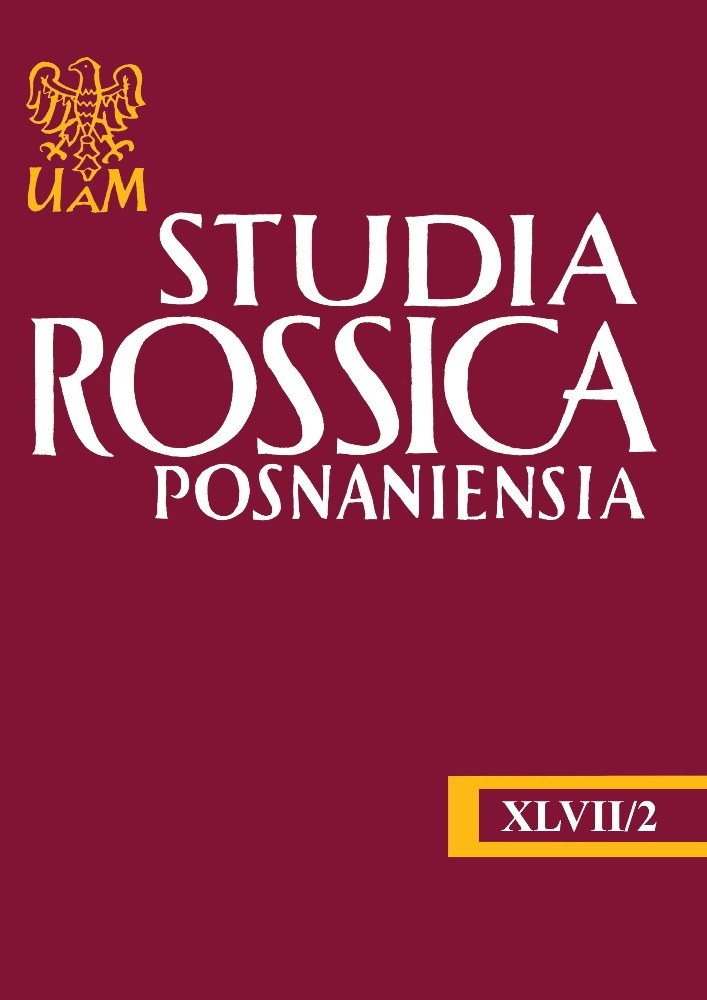Abstract
In the article the scientific works of Mikhail Bakhtin are considered as one text with its own single metaplot. The motive of moving forward (“going forward”) is analyzed and treated as the basis of Bakhtin’s progressive outlook, his hopes for the future and for the dialogue in the Great Time. Attention is drawn to a specific period of the Russian thinker’s intellectual life, that is associated with the departure from the ideas of solipsism. The concept of “I – others” is considered a turning point and is compared with the Copernican revolution, which is carried out in the philosophical worldview of a Russian scientist and then transferred to the studies of the works of Fyodor Dostoevsky. It reveals, in particular, the philosopher’s gradual departure from individual reality and his approach towards personalism. The future for Bakhtin is a creative, active category that determines the present. At the same time it is noted that the forward movement as expressed by the Russian thinker is ambivalent and associated with the turn to the past and the source. Along the way the concepts of memory, the curvature of progress, the idea of historical inversion, etc. are also studied. Besides, Bakhtin’s criticism of the Enlightenment idea of progress, Western rationalism and humanism are mentioned. In this regard Bakhtin’s concept of the rebirth acquires great importance, in which, under the influence of movement towards the future, the past is updated.
Literaturhinweise
Ajrapetân, Vardan. Tolkuâ slovo. Opyt germenevtiki po-russki. Moskva, Institut filosofii, teologii i istorii sv. Fomy, 2011.
Bahtin, Mihail. Sobranie sočinenij. T. 1. Moskva, Âzyki slavânskoj kulʹtury, 2003.
Bahtin, Mihail. Sobranie sočinenij. T. 2. Moskva, Russkie slovari, 2000.
Bahtin, Mihail. Sobranie sočinenij. T. 3. Moskva, Âzyki slavânskih kulʹtur, 2012.
Bahtin, Mihail. Sobranie sočinenij. T. 4 (1). Moskva, Âzyki slavânskih kulʹtur, 2008.
Bahtin, Mihail. Sobranie sočinenij. T. 4 (2). Moskva, Âzyki slavânskih kulʹtur, 2010.
Bahtin, Mihail. Sobranie sočinenij. T. 5. Moskva, Russkie slovari, 1997.
Bahtin, Mihail. Sobranie sočinenij. T. 6. Moskva, Russkie slovari, Âzyki slavânskih kulʹtur, 2002.
Bahtin, Nikolaj. Filosofiâ kak živoj opyt. Izbrannye statʹi. Moskva, Labirint, 2008.
Bèkon, Frensis. Sočineniâ v dvuh tomah. T. 2. Red. Aleksandr Subbotin. Moskva, Myslʹ, 1978.
Bočarov, Sergej. Filologičeskie sûžety. Moskva, Âzyki slavânskih kulʹtur, 2007.
Klûčevskij, Vasilij. Sočineniâ. T. 9. Moskva, Myslʹ, 1990.
Paskalʹ, Blez. Traktaty. Polemičeskie sočineniâ. Pisʹma. Per. s francuzskogo Oleg Homa, Sergej Dolgov. Kiev, Port-Royal, 1997.
Simvol very. Web. 14.04.2022. https://www.pravmir.ru/simvol-very/.
Solovʹev, Èrih. Prošloe tolkuet nas. Očerki po istorii filosofii i kulʹtury. Moskva, Politizdat, 1991.
Svasʹân, Karen. Stanovlenie evropejskoj nauki. Moskva, Evidentis, 2002.
Lizenz
Die Veröffentlichung von Texten geschieht in Übereinstimmung mit der Creative-Commons-Lizenz:
Namensnennung-Nicht kommerziell-Share Alike 4.0 International - Creative Commons


